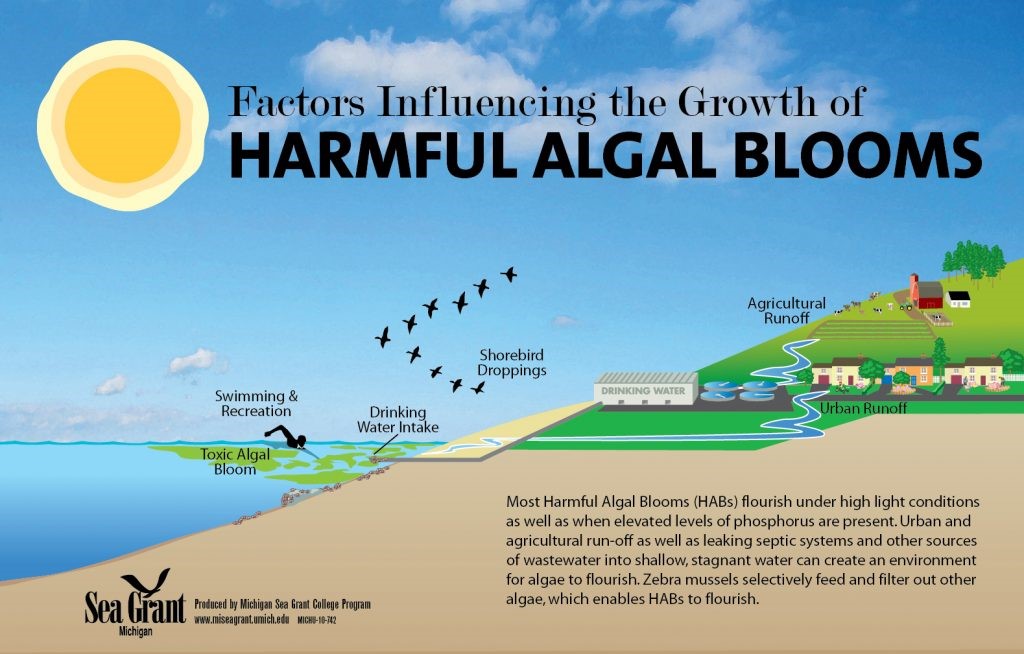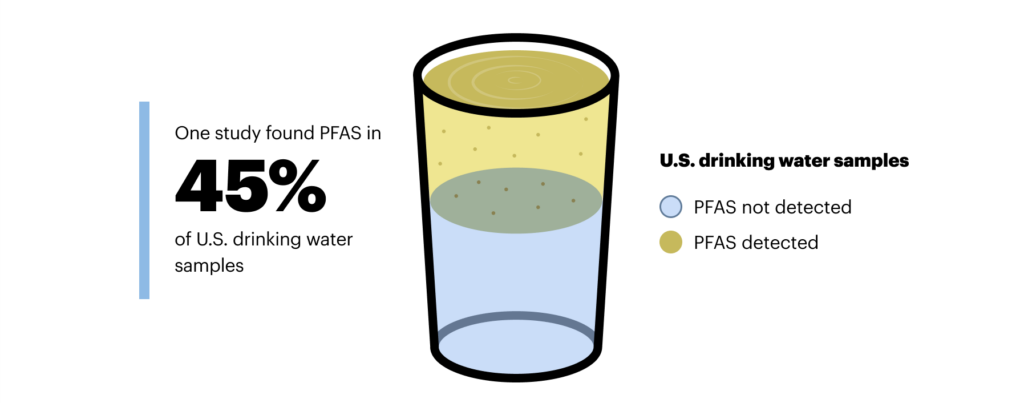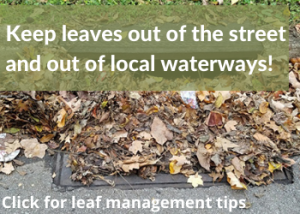The Effects of Water Pollution
Water is essential for supporting the life of people, plants, and animals. When our water becomes polluted due to man-made circumstances, this creates difficulty in sustaining the health of ourselves and the environment. Examples of water pollutants include oils, feces, heavy metals such as lead, industrial waste, and harsh chemicals like fertilizers, pesticides, and insecticides. Human activities such as agriculture, mining, drilling, urbanization, and sewage systems contribute to these pollutants entering into waterways. We depend on these ecological systems as they play vital roles in our environment such as supporting biodiversity, and providing essential resources. Although there are many kinds of pollutants discharged into our rivers and streams, chemicals used to maintain agriculture and turf lawns are amongst the most common.
An area located in the Gulf of Mexico called the “Dead Zone” (Baird 2022) is the direct result of pollution caused by fertilizer and pesticide usage. Fertilizers and pesticides containing nitrate and phosphorus are leached, washed, or drained away, into smaller bodies of water such as creeks and streams, which then flow into larger bodies of water. High concentrations of nitrates can cause the aquatic environment to become overloaded with nutrients, leading to a rapid growth of algae, commonly known as an algae bloom. These algae blooms can ultimately result in the creation of a dead zone (Boudreau et al., 2024). Microorganisms called cyanobacteria are responsible for creating algal blooms. Cyanobacteria occur in most freshwater systems and are photosynthetic, which may be helpful for aquatic food systems in very small amounts. However, cyanobacteria populations can reach harmful levels, leading to depleted oxygen levels in water, creating a hypoxic environment. This negatively impacts aquatic life by blocking the sunlight for plants and reducing oxygen levels for fish, resulting in biodiversity degradation (Denchak, 2023). It is important to recognize that Illinois is a major contributor to the dead zone in the Gulf. lthough this hypoxic zone in the Gulf of Mexico is a primary example, it is not the only area of concern. In 2012, 13 bodies of water in Illinois were sampled for cyanobacteria, and 10 of the 13 showed high enough levels of cyanobacteria to cause health problems during recreational activities (IEC, 2021).

Figure 1:Harmful Algal Blooms | Michigan Sea Grant. (n.d.). Sea Grant Michigan.
The Effects of Water Pollution in McLean County
Examining the current threats to our local watersheds gives us a clear understanding of how people contribute to the contamination of our waters.
According to the Lake Bloomington & Evergreen Lake Watershed Plan published in 2021, there is a high prevalence of nitrates and phosphorus throughout these bodies of water. The total phosphorus count and total nitrate count in Money and Six Mile Creek (two streams which flow into Lake Bloomington and Evergreen Lake) have both regularly exceeded the Illinois Nutrient Science Advisory Committee guideline (City of Bloomington, 2021). Nitrogen particles are commonly found in fertilizers, while phosphorus is excreted through human and animal waste. These high nutrient levels are primarily due to agricultural runoff, but point source pollution such as urban runoff, also contributes greatly to the problem (Lake Bloomington & Lake Evergreen Watershed Plan Committee 2012). The increase in non-permeable surfaces like roads, parking lots, and turf grass, along with the usage of chemicals for lawn care, has increased urban stormwater runoff as less water is absorbed and filtered through the ground and instead flows into storm drains which wash into local waterways like creeks. This leads to higher concentrations of pollutants in streams (Water Science School, 2018). In urban areas, rain gardens, rain barrels, and Yard Smart Yards are utilized to reduce runoff.
In 2025 the City of Bloomington treated parts of Lake Bloomington and Evergreen Lake due to unexpected algal blooms, which were the result of nutrient runoff containing high levels of phosphorus (Project Updates | City of Bloomington, Illinois, 2025). When the Lakes collect contaminated water, there is less control of algal growth due to an increase in microcystin, a toxin that creates the blooms. Fertilizers are one of the primary polluters to enter our waterways but there are ways to mitigate its adverse effects on wildlife as well as ourselves. If you are using fertilizer to maintain your lawn, try opting for a 0% phosphorus fertilizer or become Yard Smart and use compost to fertilize. In doing this, more sustainable methods are adopted, furthermore decreasing the amount of water pollution flowing into Lake Bloomington and Evergreen. Other ways to reduce water pollution occurring in our drinking water would be picking up pet waste, ensuring proper septic tank maintenance, and promoting native landscaping, as these also impact the quality of this water source (Long, 2019).
Leaves in excess that are not managed properly can also contribute to pollution. Often, leaves are blown into the streets (or they are incorrectly raked into the streets by residents), especially after rainfall, and enter storm drains that connect to other bodies of water leading to Lake Bloomington and Lake Evergreen. As the leaves decay, they release phosphorus and nitrogen into the water (Office of Communications and Publishing, 2016). This contributes to oxygen depletion, which is harmful to our overall waterway. If you want to change your disposal habits, proper leaf management is the way to go!
Old, malfunctioning septic systems also contribute to water contamination as high levels of phosphorus can be found in released sewage. As of 2024 there were over 10,000 septic systems in McLean County. These systems should be properly maintained to remove most disease-causing pathogens (like E. coli), chemicals, and nutrients from wastewater. When a septic system is not maintained correctly, it may impact an entire community in several ways. It may create a breeding ground for mosquitoes and other pests, emit unpleasant smells, lead to expensive repairs from sewage backing up into homes, spread harmful diseases, and/or contaminate groundwater. Other ways to keep your septic system eco-friendly and running smoothly include keeping non-biodegradable materials such as sanitary pads, paper towels, “flushable” wipes, and plastics out of your tank. Engaging in these practices will not only benefit our environment, but will also protect your property value.
In the winter, road salt or Sodium Chloride (NaCl) is utilized to reduce the adherence of snow and ice on paved roads, sidewalks, and other pathways. Although, road salt temporarily prevents accidents on the road, it still negatively impacts the environment causing harm to aquatic life and vegetation, while also accelerating the corrosion of our infrastructures and roads (Szklarek et Al. 2022). According to the United States Environmental Protection Agency, nearly $5 billion is spent to repair those corrosive effects annually. NaCl has been found within our waterways such as local creeks, streams, and other bodies of water not only in the winter but year-round. The National Great Rivers Research and Education Center recorded 475 stream miles listed as impaired in 2018 due to elevated NaCl levels from road salt usage in Illinois. To help reduce road salt usage, learn how to be Salt Smart!
Lastly, not only are the chemicals harmful, some of them are “forever”. Polyfluoroalkyl substances (PFAS) have been widely used in various products since the 1940s. They are found in food packaging, fire extinguisher foam, waterproof products, non-stick pans, and more, due to their properties of being oil, water repellant, and flame resistant (Simba, 2021). PFAS do not break down when released into the environment, allowing them to easily move into surface and groundwater. Another concern is that food grown in contaminated soil or water can transfer these chemicals into our food. PFAS are hormone-disrupting chemicals that may interfere with the endocrine system. They are linked to health problems such as reproductive issues, liver and thyroid problems, kidney and testicular cancer, and increased risk of birth defects (Illinois Environmental Protection Agency). Although the US no longer produces Perfluorooctanoic Acid and Polyfluoroalkyl substances (two types of PFAS), other countries still do, so imported goods may contain these chemicals. Researchers are continuously analyzing how to manage and remove PFAS from our environment and drinking water. Previously, the US did not have federal regulation limiting the amount of PFAS found in drinking water. However, in April 2024 the EPA announced the final National Primary Drinking Water Regulation for six different PFAS. This regulation requires public water systems to monitor for and inform residents of these PFAS in drinking water, implement solutions that reduce these PFAS, and notify the public if they are ever in violation (EPA, 2025). One way that exposure can be reduced is by cooking with stainless steel or cast-iron cookware instead of non-stick pans. Non-stick pans use Teflon (a name-brand PFAS) for the water-proof coating whereas stainless steel and cast iron utilize oil to gain non-stick-like properties. Avoiding oil and water-resistant food packaging and clothing, avoiding stain resistant coatings on carpet and furniture, decreasing usage of personal products that contain PFAS, and utilizing water filters designed to remove PFAS such as carbon filtration can all help to diminish the quantity of PFAS we consume (IEPA, 2025).

The fight against local water pollution is one we can win together. By uniting as a community, we can take small yet powerful steps to reduce waste, promote sustainable practices, and protect the waterways that sustain us. Each action, whether big or small, contributes to a healthier environment for everyone. Let’s come together to safeguard our water and ensure a cleaner, brighter future for generations to come.
References
Baird, V. (2022). What’s That?! New Internationalist, 538, 32–34.
Boudreau, D., McDaniel, M., Sprout, E., & Turgeon, A. 2024. “Pollution.” National Geographic. https://education.nationalgeographic.org/resource/pollution/
Denchak, M. 2023. “Water pollution: everything you need to know.” Natural Resources Defense Council. https://www.nrdc.org/stories/water-pollution-everything-you-need-know#whatis
Evergreen Lake Watershed Plan Committee. 2012. “Evergreen lake watershed plan.” https://mcleanwater.org/wp-content/uploads/sites/3/2012/03/Evergreen_Lake_Watershed_Plan.pdf
Draft Lake Bloomington & Evergreen Lake Watershed Plan | City of Bloomington, Illinois. (2025). Bloomingtonil.gov. https://www.bloomingtonil.gov/departments/engineering-public-works-water/water/project-updates/draft-lake-bloomington-evergreen-lake-watershed-plan
IEC. 2021. “Lead in drinking water.” Illinois Environmental Council. https://ilenviro.org/clean-water/lead-in-drinking-water/
IEC. 2021. “Nutrient Pollution.” Illinois Environmental Council. https://ilenviro.org/nutrient-pollution/
Illinois EPA. “Per- and polyfluoroalkyl substances.” Illinois Environmental Protection Agency. https://epa.illinois.gov/topics/water-quality/pfas.html
Long, L. (2019, January 10). Top 10 Ways: How to Prevent Harmful Algal Blooms and
Cyanobacteria. SOLitude Lake Management: Full-Service Lake and Pond Management. https://www.solitudelakemanagement.com/10-ways-prevent-harmful-algal-blooms-cyanobacteria-toxic-blue-green-algae/
Project Updates | City of Bloomington, Illinois. (2025). Bloomingtonil.gov. https://www.bloomingtonil.gov/Home/Components/News/News/10367/1584
Office of Communications and Publishing. 2016. “Removal of fallen leaves can improve urban water quality.” U.S. Geological Survey. https://www.usgs.gov/news/state-news-release/removal-fallen-leaves-can-improve-urban-water-quality
Per- and Polyfluoroalkyl Substances. (n.d.). Epa.illinois.gov. https://epa.illinois.gov/topics/water-quality/pfas.html
Simba, I. 2021. “PFAS: a toxic legacy building in Illinois.” Illinois Environmental Council. https://ilenviro.org/pfas-a-toxic-legacy-building-in-illinois/
Szklarek et. Al. 2022. “The effects of road salt on freshwater ecosystems and solutions for mitigating chloride pollution – a review.” The Science of the total environment, 805, 150289. https://pubmed.ncbi.nlm.nih.gov/34536879/
Town of Normal. 2010. “Community-wide sustainability plan and 2035 report: plans for a sustainable Normal.” https://www.normalil.gov/DocumentCenter/View/872/2035-Report-or-Community-Wide-Sustainability-Plan?bidId=
United States Environmental Protection Agency. (2024, April 10). Per- and polyfluoroalkyl substances (PFAS). https://www.epa.gov/sdwa/and-polyfluoroalkyl-substances-pfas
Water Science School. 2018. “Impervious surfaces and flooding.” U.S. Geological Survey. https://www.usgs.gov/special-topics/water-science-school/science/impervious-surfaces-and-flooding




